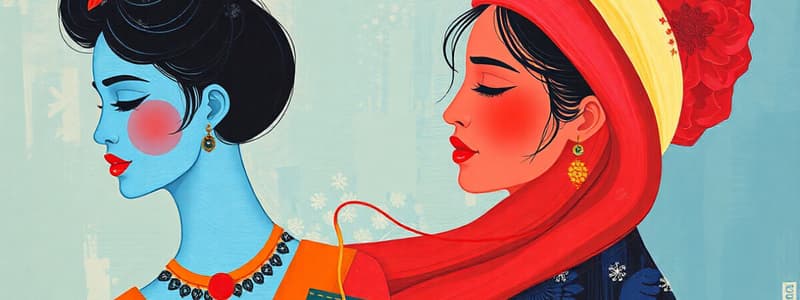Podcast
Questions and Answers
What largely determines women's roles in society across different cultures?
What largely determines women's roles in society across different cultures?
- The level of education and economic opportunities available (correct)
- The age of women in the society
- The religion practiced in the community
- Government policies on gender
Which of the following factors contributes to the disparities women face in the workforce?
Which of the following factors contributes to the disparities women face in the workforce?
- Cultural traditions that support male dominance (correct)
- The presence of gender-based violence
- High levels of female education in the workforce
- Widespread acceptance of gender roles
What ongoing effort is recognized globally in the pursuit of gender equality?
What ongoing effort is recognized globally in the pursuit of gender equality?
- Encouraging more women to pursue domestic roles
- Limiting women's participation in politics
- Restricting women's access to education
- Promoting economic empowerment for women (correct)
Which statement best describes the progress toward gender equality in various societies?
Which statement best describes the progress toward gender equality in various societies?
What is a common characteristic of modern Western societies in relation to gender roles?
What is a common characteristic of modern Western societies in relation to gender roles?
In many traditional Asian communities, what is typically expected of women?
In many traditional Asian communities, what is typically expected of women?
Which of the following statements about women in East Asian cultures is true?
Which of the following statements about women in East Asian cultures is true?
What is a common characteristic of gender roles in many African societies?
What is a common characteristic of gender roles in many African societies?
How have modern influences affected gender roles in African societies?
How have modern influences affected gender roles in African societies?
What trend has been observed in Western societies regarding gender roles in recent decades?
What trend has been observed in Western societies regarding gender roles in recent decades?
Which of the following factors has influenced shifts in gender roles in Asian societies?
Which of the following factors has influenced shifts in gender roles in Asian societies?
Which of the following is NOT a characteristic of gender roles in Western societies?
Which of the following is NOT a characteristic of gender roles in Western societies?
Which aspect of gender roles is emphasized in many rural traditional Asian communities?
Which aspect of gender roles is emphasized in many rural traditional Asian communities?
Flashcards
Asian Gender Roles
Asian Gender Roles
Vary across Asia, with traditional roles emphasizing distinct expectations for men and women, but modern influences are changing these patterns.
African Gender Roles
African Gender Roles
Show wide variations across Africa, with traditional roles often varying by region, ethnicity, and socioeconomics. Modern influences are changing these patterns.
Western Gender Roles
Western Gender Roles
Exhibit a shifting away from strictly defined traditional roles, with a historical emphasis on distinct public and private spheres for men and women, but significant progress toward gender equality has occurred.
Traditional Asian Female Roles
Traditional Asian Female Roles
Signup and view all the flashcards
Traditional Asian Male Roles
Traditional Asian Male Roles
Signup and view all the flashcards
Changing Gender Roles - Africa
Changing Gender Roles - Africa
Signup and view all the flashcards
Shifting Gender Roles - West
Shifting Gender Roles - West
Signup and view all the flashcards
Cultural Influences on Gender Roles
Cultural Influences on Gender Roles
Signup and view all the flashcards
Women's workforce participation
Women's workforce participation
Signup and view all the flashcards
Gender equality disparities
Gender equality disparities
Signup and view all the flashcards
Fluid gender roles
Fluid gender roles
Signup and view all the flashcards
Cultural influence on women's roles
Cultural influence on women's roles
Signup and view all the flashcards
Global gender equality efforts
Global gender equality efforts
Signup and view all the flashcards
Study Notes
Gender Roles in Asian Societies
- Gender roles in Asian societies are diverse and vary significantly across the continent. Traditional gender roles often emphasize distinct expectations for men and women, though modern influences are changing these patterns.
- In many rural and traditional Asian communities, women are often expected to prioritize domestic responsibilities like childcare and household duties. Men often take on roles related to financial support and public life.
- However, significant variations exist. In some East Asian cultures, women have traditionally held a more prominent role in business ownership and family businesses, while in others, women's roles are significantly more restricted.
- The influence of Confucianism and other traditional philosophies has shaped attitudes towards gender in several Asian countries, with varying degrees of adherence.
- The rise of economic opportunities and education has brought about shifts in these traditional roles, with more women entering the workforce.
Gender Roles in African Societies
- African societies display wide variations in gender roles, with significant differences across different regions, ethnic groups, and socioeconomic factors.
- Traditional roles often involved women in agriculture, domestic work, and raising children, while men focused on hunting, herding, and community leadership.
- However, these roles are complex and not strictly defined in all cases, with variations influenced by culture and the specific community or tribe.
- In many modern African societies, women are increasingly involved in economic activities and political leadership. However, this progress is not uniform across the continent.
- Societal norms and cultural expectations still hold weight in defining roles, although these are evolving due to education, urbanization, and globalization.
Gender Roles in Western Societies
- Western societies, encompassing North America and Europe, are characterized by a gradual shift away from highly defined traditional gender roles.
- Historically, the traditional gender roles have often emphasized distinct spheres for men and women, with men traditionally associated with the public sphere and women with the domestic sphere.
- However, significant progress toward gender equality has occurred in many parts of Western societies over the past decades. Women have increasingly entered the workforce in diverse occupations and achieved greater levels of political representational power.
- Despite improvements, disparities still exist, particularly regarding pay equity, representation in leadership roles, and access to opportunities in certain professions. There are different views on the causes and effects, as well as the need for further societal change.
- Modern Western societies are increasingly characterized by fluid gender expressions and roles with a focus on equality and inclusivity, although varying levels and progress are seen across different parts of these societies.
Women's Roles in Different Parts of the World
- Women's roles worldwide are highly diverse, influenced by cultural context, socioeconomic status, and historical factors.
- In some cultures, women have traditionally played a significant leadership role in economic and social spheres, while in others, their roles remained primarily confined to the domestic realm.
- Education levels, economic opportunities, and cultural norms substantially influence the degree of participation women have in society.
- Worldwide, there are ongoing efforts to achieve progress in gender equality movements, with activists working against gender-based violence and promoting economic empowerment for women.
- The degree of progress toward gender equality varies greatly across the global landscape.
Studying That Suits You
Use AI to generate personalized quizzes and flashcards to suit your learning preferences.




